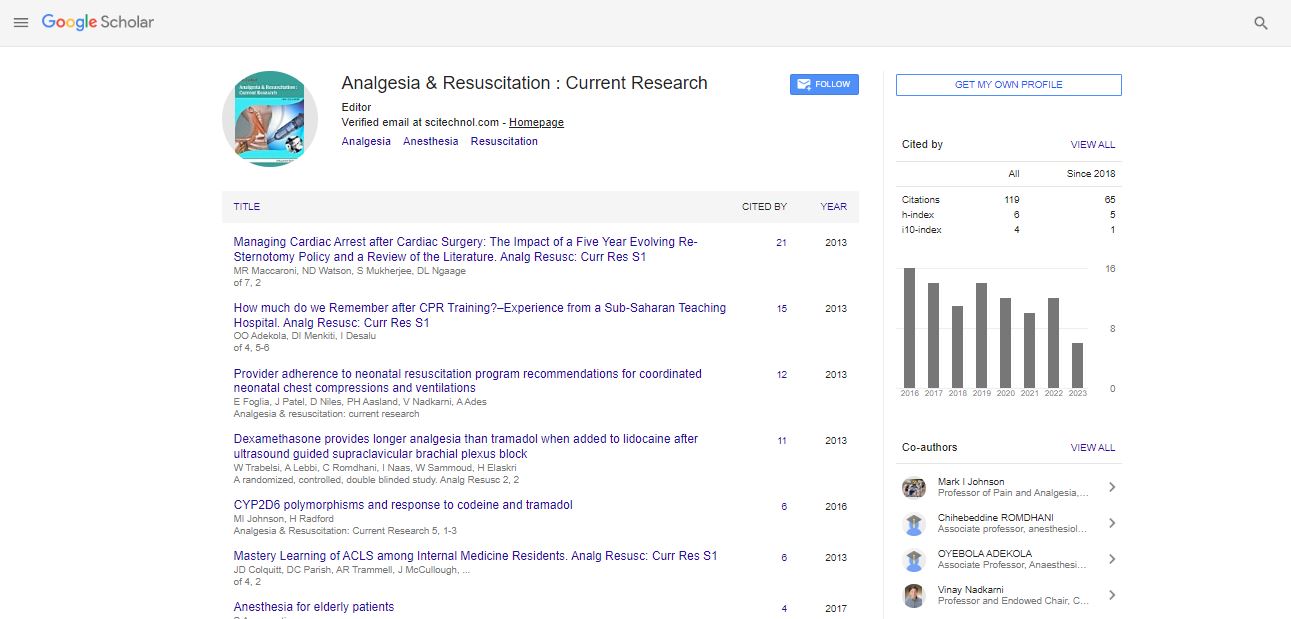Efficacy and safety of the novel sodium channel Blocker CNV1014802 in Trigeminal Neuralgia and Lumbosacral Radiculopathy
Mark Versavel
akta Pharmaceutical Development, USA
: Analg Resusc: Curr Res
Abstract
CNV1014802 is a novel small molecule state-dependent sodium channel blocker that exhibits potency and selectivity against the Nav1.7 sodium channel. CNV1014802 was evaluated in two Phase 2 trials in neuropathic pain conditions. Efficacy and safety were evaluated in a randomized withdrawal Phase II clinical trial in subjects with trigeminal neuralgia (TGN). Following an initial 21 day open-label treatment period with CNV1014802 at a dose of 150 mg three times a day (tid), subjects who showed a successful response in the final week of the period, defined as a 30% or more reduction in number or severity of paroxysms relative to the run-in period, were then randomized to a 28 day double-blind treatment period with either CNV1014802 150 mg tid or placebo. All subjects entering the study had to have a pre-specified number of paroxysmal attacks of at least moderate severity. A total of 67 patients were recruited into the study and 69% of those patients completing the open label period were randomized as responders into the double-blind phase of the study. CNV1014802 was well tolerated and the study showed a consistent reduction of pain severity and number of paroxysms in all primary and secondary outcomes. In the primary endpoint of the study there was a treatment failure rate of 33% for CNV1014802 vs 65% for placebo and a favorable separation from placebo on the Kaplan Meier time to relapse. CNV1014802 showed a 2.3 unit decrease vs placebo in the NRS scale for pain intensity, 60% reduction in paroxysms vs. 12% on placebo, and 55% decrease in pain severity vs. 18% on placebo, by the end of the study. There were no serious adverse events related to the drug and the adverse event profile of the drug was similar to placebo in the double blind phase of the study. A second Phase 2 study was conducted in subjects with lumbosacral radiculopathy (LSR). This was a randomized, double-blind, placebo-controlled cross-over study designed to evaluate the efficacy and safety of orally administered CNV1014802 at a dose of 350 mg twice per day, in 81 subjects with pain associated with LSR. There was a statistically significant difference of -0.43 (p=0.0265) between CNV101802 and placebo in the primary endpoint, Pain Intensity-Numerical Rating Scale (PI-NRS) mean change from baseline to week 3. Additional exploratory analyses showed that for the subset treated by ‘802 alone, comprising 60% of patients randomized, there was an enhanced statistically significant reduction in pain (PI-NRS mean change at week 3, -0.72; p=0.0039). There were no serious adverse events related to the drug in this trial and CNV1014802 was very well tolerated. In conclusion, clinical proof of concept has been achieved with CNV1014802 in two Phase 2 trials and the compound was well tolerated without need for titration.
Biography
Mark Versavel, MD, PhD, MBA is President and Founder of vZenium LLC, providing consulting services in clinical drug development in neurology and psychiatry, and Principal of akta Pharmaceutical Development. He is consulting CMO at Alzheon and responsible for clinical development of ALZ-801, a prodrug of tramiprosate, in Alzheimer’s Disease. He has 25 years of clinical development experience in multiple neurology and psychiatry indications across the areas of clinical pharmacology, early and late phase clinical trials and support of marketed products. He has worked for Pfizer from 1999 till 2003 in France as international clinical lead for pregabalin (Lyrica) in neuropathic pain and epilepsy, and from 2003 till 2008 in New London / Groton as local clinical lead for sumanirole in Parkinson’s disease and restless legs syndrome, and global clinical lead for ziprasidone (Geodon) in schizophrenia and bipolar disorder. He received his MD from the University of Antwerp in 1983, PhD in clinical pharmacology from the Humboldt University in Berlin in 2003 for the validation of a computerized cognition test system, and MBA from the University of Michigan in 2003.
 Spanish
Spanish  Chinese
Chinese  Russian
Russian  German
German  French
French  Japanese
Japanese  Portuguese
Portuguese  Hindi
Hindi 
